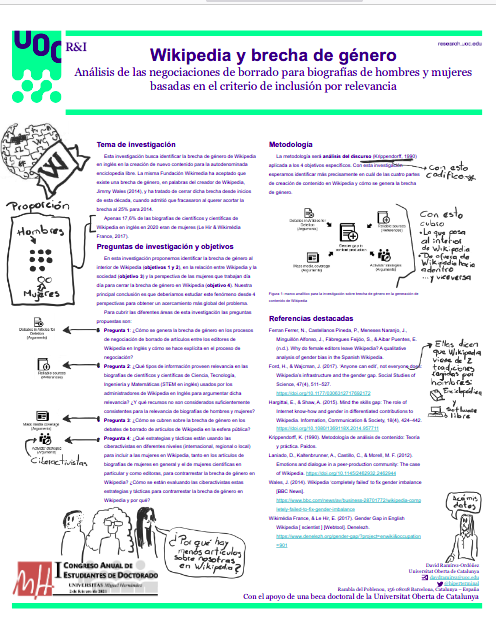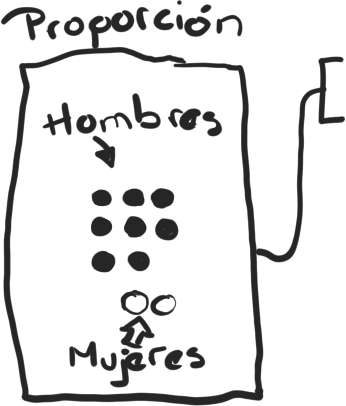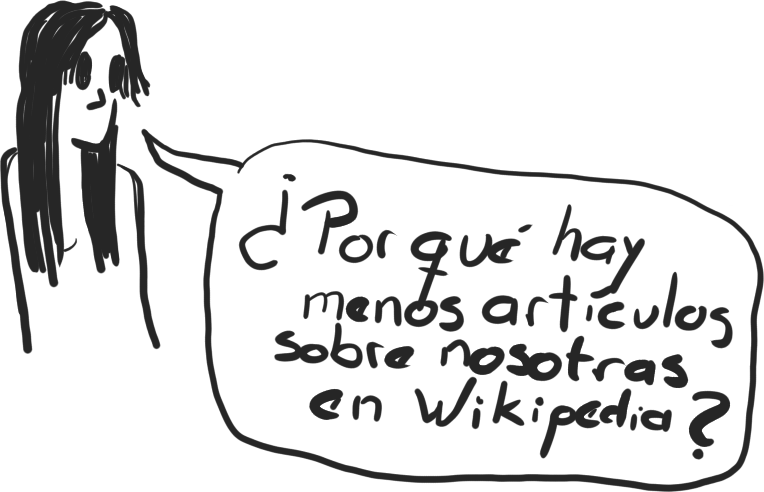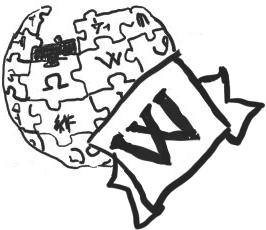Poster about Wikipedia and gender gap
February 02, 2021
This post is a digital garden and I am still cultivating it :-)
I was part of the First PhD students congress, where I presented the research plan of my PhD on Wikipedia and gender gap. This event was organised by Universitas Miguel Hernández at Alicante. Here you can download the poster and the figure shows a screenshot of the poster.

The research plan
I presented my research plan, the plan I am working with my supervisors, Núria Ferrán and Julio Meneses. This plan has 4 specific objectives, including:
- Articles for Deletion
- Reliable resources
- Mass media analysis
- Interviews to cyberactivists
To create the poster I was thinking about detailed information on the research, but that means a lot of text and probably not being able to have a clear idea about what I was working on. That's why I added an additional layer, inspired in comics and side notes you can find in shared books, as books from libraries. I remember being aware of comments and underlines by previous readers of the books I was lending at the Luis Ángel Arango Library and nowadays at Guinardó - Mercè Rodoreda public library in Barcelona.
I wanted to include a simple data visualisation, hand-made, because I feel this helps me to understand proportions. There you can see the Wikipedia gender gap in the contents of the encyclopedia. There is also a gender gap in the number of female editors. In this image you can se in black dots the number of men's and in white the number of women's biographies. (Hombres means Men and Mujeres means Women in Spanish ).

I thought was a good idea to include the character from 2020 promoting this webinar on Wikipedia, gender gap and libraries (in Spanish) to make her present the main idea of my research and give a tribute to Núria, my supervisor. I was reading other comics as United States of plastic en The Guardian by Susie Cagle, where she adapted a research to a comic to make it easy to understand. I read What if...? by Randall Munroe to get scientific answers to absurd questions, like what if we have to update a printed Wikipedia?
At least that helped me to make better questions. In the next image she is asking "Why there are less articles about us on Wikipedia?"

I underlined one of my favourite articles in the research bibliography, Anyone can edit? not everyone does: Wikipedia’s infrastructure and the gender gap by Heather Ford and Judy Wajcman. By the way Judy Wajcman was part of a webinar on technofeminism, art and disidents in Bogotá. In the same event but couple of weeks later, Remedios Zafra presented Feminism and Internet: after the enthusiasm - in Spanish. Anyway, I think didn't draw and underline as much as I should but well, is my first poster.
One of my favourite webinar from 2020 was "Make feminist the open" by Irene Soria (Mexico) at the Creative Commons Summit. Is heart touching and even Irene cried in that presentation where she expressed crystal clear the inequity in the intersectionality and I have to admit it happened to me too. I didn't write on the poster about Irene's presentation but she is influencing me for this research.
The languages
One of the comments I got on other places was about why I am studying Wikipedia in English and not the Spanish version. The main argument in this question was the fact Spanish is not a minor language, there are many research about the English Wikipedia and not so many in the Spanish Wikipedia. I think make a research in your native language is required to decolonise the mind, as probably Ngũgĩ wa Thiong'o can says.
I was counting the Articles for Deletion category, to take as an example my first specific objective. The Wikimedia in English for February 8th has 44 proposals and the Articles for Deletion in Spanish for the same day 36. You can find more proposals in the English version, which means you have more data to analyse and more possibilities to identify patterns, once you find those patterns you can apply the same method to other languages, not just Spanish.

Another approach is try to find where are more scientists, because my research is not focused on any women's biography but only on scientists. Checking the Nobel Prize winners I found the first and second country on the list are United States and United Kingdom, both English speakers.
I think we should do something regarding the research on English as well as in other languages, but at the same time I am aware of being part of an academic environment, where English is the main language some sword of lingua franca. I can get my PhD publishing in academic journals in the first or second quartile, journals generally written in English. I learnt in my master degree on Education that you can learn in communities of practice, you don't need the academy exclusively to learn an it can happens under informal education. I choose the academic circuit, inside the formal education and I want to learn the norms of this circuit to make other kind of research with other methodologies in other languages. I believe if this research is going to be an anti academic research to name it in anyhow, start and develop it in the academia is a very bad first step.
I believe that following a decolonial logic, the debate could not be if the research is on English or Spanish, but you need to include indigenous languages in this debate. In Colombia you have the possibility to researh on wayuu or quechua, but if you change English to Spanish at the end you are changing a colonial language for another colonial language. Same old, same old.
Open science
I want to follow Open Science parameters, that's why you can download editable files, as I mentioned in this blog post about open access as the first step for open science. Here you can find the research plan bibliography in Zotero and here the Better CSL JSON file compressed.
I started my qualitative analysis using RQDA but it doesn't work after an update. I replace it with QualCoder that actually has better features than RQDA.
The poster session
Here you can find every single poster on the social science session. Among them you can download my poster about Wikipedia and gender gap. In this event my colleagues Luisa, Israel, Efrem and Marta presented their posters. I am interested in this poster about the analysis of the results of the elections on the peace agreement in Colombia by Angélica Caicedo-Moreno and Lorena Gil de Montes.
In another conversation with my colleagues, Efrem shared this video about posters design. This is the first time i made a poster for a congress and I want to try what this video is suggesting, to structure the poster with different levels of information. This congress was a little bit strange to me because is the first time I presented anything after the pandemic declaration, that makes me think about introduce a new feature to the posters like this publication to explain in detail what is presented.
I imagine from now the congress are going to be hybrid, between a physical and digital event.